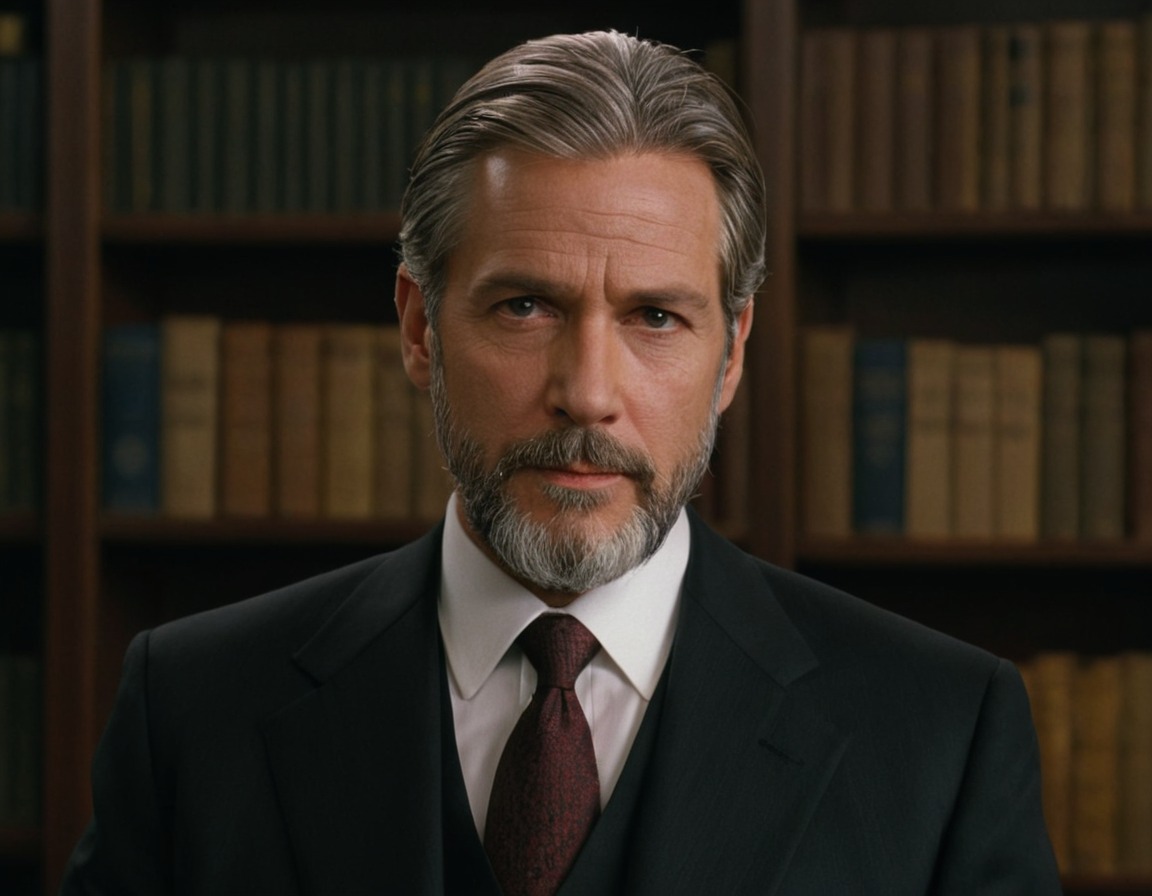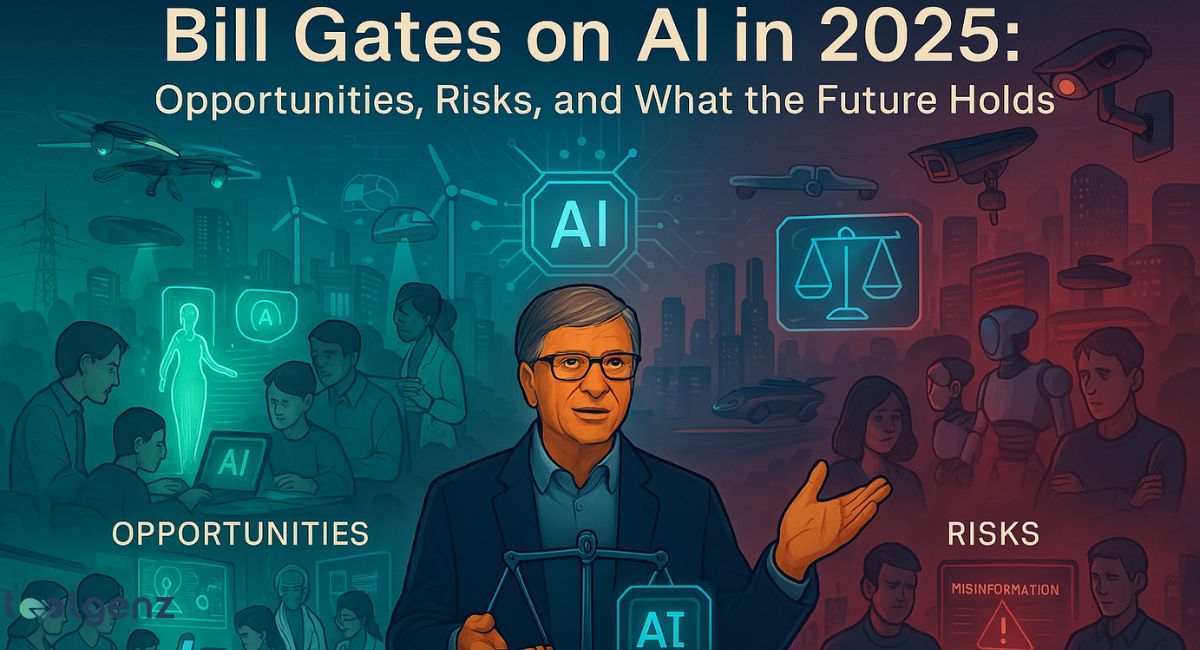In 2025, Bill Gates on AI future is more relevant than ever. The tech visionary sees artificial intelligence as both a powerful tool and a serious challenge.
Gates believes AI-powered technologies will transform everything from education to medicine. However, he also warns about the risks of artificial intelligence, like job losses and misinformation.
His insights come from decades of experience, including the Microsoft and OpenAI partnership, which helped shape the current AI boom.
He shares a vision where expert-level advice becomes accessible to everyone, where expert-level advice becomes available to everyone.
In this article, we’ll explore his latest thoughts, hopes, and warnings about the road ahead with AI in the United States and beyond.
As we move deeper into the AI era, His outlook strikes a thoughtful balance between hope and concern.
Understanding both the benefits and dangers of AI systems is essential for policymakers, educators, and the general public.
His vision helps frame the choices we must make to ensure a responsible and inclusive AI-powered future.
Why Bill Gates Says AI Is Both a ‘Fantastic Opportunity’ and a Major Concern
In Gates’ words, AI is a “fantastic opportunity” because it gives us tools that were impossible before.
We now have free intelligence that can offer medical advice, write code, and tutor students. He believes AI might help us tackle major global challenges, from healthcare to education.
But with that power comes risk. He also sees risks of artificial intelligence in areas like jobs, politics, and human learning.
Tools like intelligent automation tools and AI-powered tutoring systems may make life easier. But they may also leave many people behind. That’s why He emphasizes the need for balance.
He encourages governments and tech leaders to build strong policies that protect jobs and ensure fair access to AI benefits.
For Gates, success in the AI era means using technology to help people, not replace them.
Bill Gates Predicted AI’s Rise and Its Global Impact Years Ago
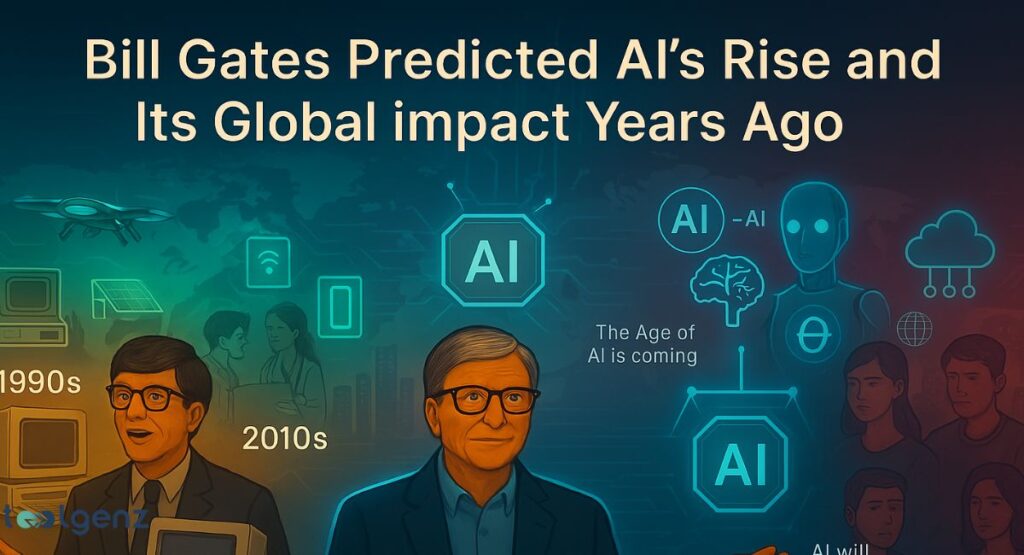
Years ago, Gates predicted the rise of AI—and he was right. At a 2017 event, he pointed to DeepMind AI milestones as the sign that AI would change the world.
Back then, it was a computer beating humans at the game Go. Today, it’s OpenAI and ChatGPT reshaping how we work and learn.
You can also read Bill Gates’ original thoughts on AI in his 2023 blog post, where he called GPT-4 a turning point in tech.
That was when he called it the biggest leap in tech since the graphical user interface. His Bill Gates AI predictions are becoming real in 2025.
He now believes we are entering a phase where artificial general intelligence is no longer science fiction, but a real possibility. This shift will impact not only technology, but how society functions day to day.
How Bill Gates Finds Comfort in History When Facing New Tech Like AI
Gates believes history offers important lessons as we face the AI revolution. He compares today’s AI ethical concerns to the early days of cars or the internet.
Every tech leap brings fear. But over time, people find ways to use it wisely.
When cars arrived, we got future regulations for AI like speed limits and safety rules. The same must happen with AI.
Gates believes the USA can lead in this. Just like we did with the PC and smartphones, we can shape AI to serve us, not scare us.
He calls on decision-makers to step in early—before the technology outpaces our ability to manage it. Learning from history can guide responsible innovation.
Bill Gates on Why We Should Focus on Short- and Medium-Term AI Challenges
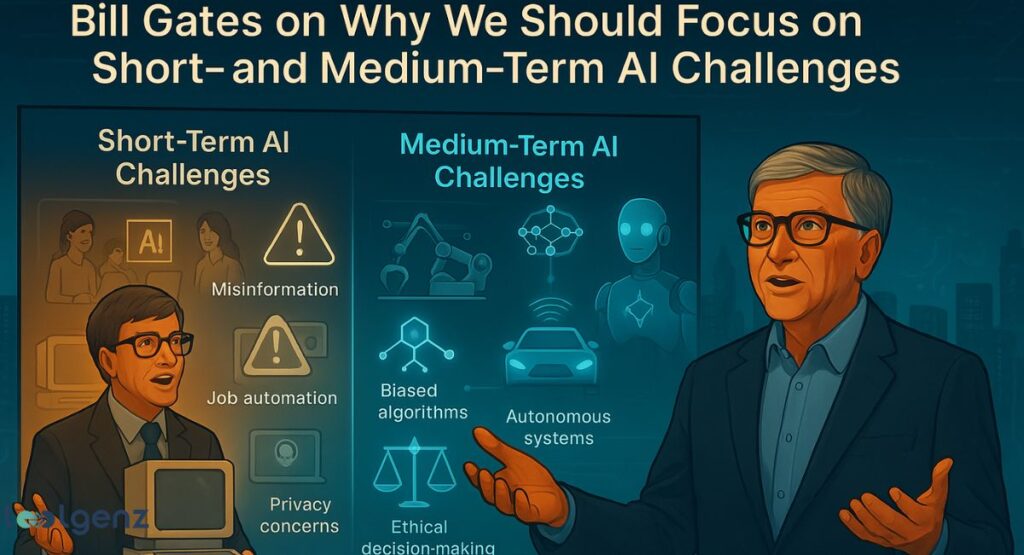
Some worry about artificial general intelligence taking over someday. But Gates says we should not only focus on far-off risks.
Instead, we must deal with what is already here. That means AI in cyberattacks, bias, misinformation, and job loss.
In his view, the real danger today isn’t AI becoming too smart—it’s how people choose to use it. It is humans using AI in harmful ways.
Tools like AI hallucinations in language models and bias in AI algorithms are already causing real problems. Gates believes our efforts should begin there.
To him, the best path forward includes better oversight, ethical practices, and greater public awareness. to handling these current dangers before they grow larger.
Bill Gates Believes AI Can Solve Problems It Also Creates
Gates remains hopeful that AI could also help solve the very issues it creates. For example, AI bias in decision making is a problem.
But smart developers can build systems to fix it. He points to Microsoft and OpenAI as key players in driving this transformation.
AI also helps find deepfake detection software to stop lies. It powers AI-driven education tools that reach more students. As long as people build AI with care, Gates thinks it will do more good than harm.
He encourages governments, tech leaders, and educators to work together in guiding this powerful shift—so that AI becomes a tool for progress, not a threat.
Bill Gates Warns AI Could Spread Misinformation and Undermine Democracy
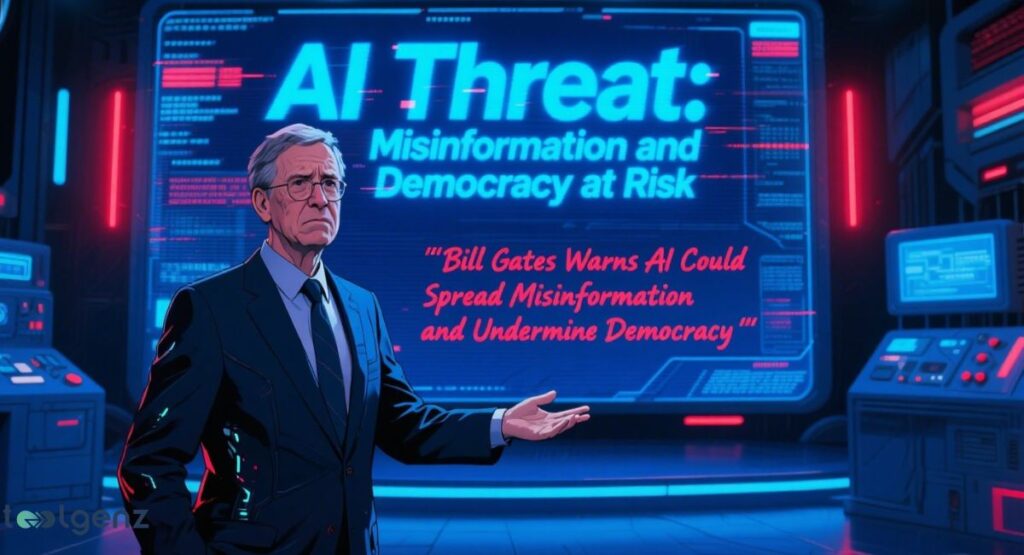
Gates is very worried about AI misinformation and democracy. He says tools like deepfakes can be used to fool voters. This could change election results. In 2024, fake videos almost swayed public opinion.
But Gates has hope. Programs like DARPA deepfake detection are being built to fight back.
He compares it to how we learned to spot phishing emails—we’ll adapt to detect AI-generated falsehoods too. The goal is to use AI to fight AI.
Still, he stresses the need for quick action. If deepfake laws and detection systems don’t keep up, public trust in democracy could suffer long-term damage.
Gates Highlights the Danger of AI in Cyberattacks and Government Disruption
Another big fear Gates shares is cybersecurity risks from AI. AI can help hackers find flaws in software faster than ever. It can also help create stronger phishing scams using public data.
He warns that the consequences could be severe if left unchecked. But again, he points out the fix is also AI. Smart defenders can use AI too.
He also supports global rules, like a digital version of the nuclear watchdog, to stop AI weapons.
He believes international cooperation is key. Without it, an AI arms race could start, leading to dangerous technologies spreading across borders with little control.
Gates on AI Replacing Human Jobs—But Creating New Ones Too
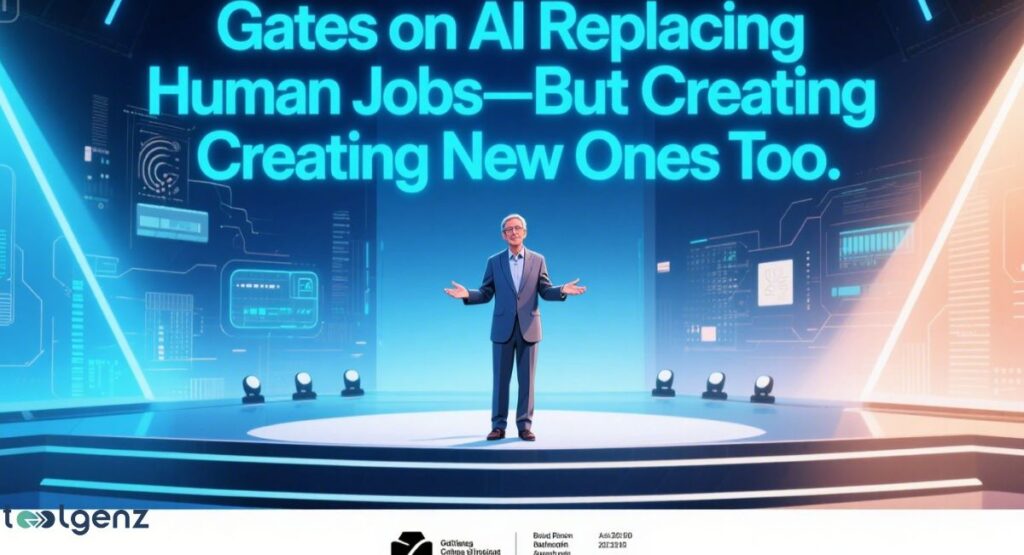
One of the biggest fears about AI is AI replacing human roles. He acknowledges that some roles will evolve or fade away as AI advances. He especially worries about office workers and customer service agents.
But he says the AI impact on workforce is not all bad. Many new roles will come. Just like the PC changed office work, AI will bring new careers. Gates wants AI job automation risks to be solved by training and support.
He believes governments and companies must invest in reskilling programs. With the right guidance, people can shift into roles where AI-powered technologies support rather than replace human effort.
Gates on AI Bias and Hallucinations: Why We Must Stay Vigilant
Gates knows that AI hallucination examples are common. These are when AI makes up facts or gives wrong answers. It happens because transformer-based AI models don’t understand context like humans.
Also, bias in AI algorithms is a real danger. If the training data is unfair, the AI will be unfair too.
He’s optimistic that with the right solutions, these flaws can be corrected. He points to labs like OpenAI and Microsoft working on making models more fair.
He believes AI ethical concerns should be addressed with better training data, stronger validation tools, and diverse developer teams. With the right efforts, these systems can become more accurate and more just over.
Why Bill Gates Is Concerned AI Will Change How Students Learn to Write
AI and student learning habits are already shifting. Gates says AI replacing teachers and doctors is a long-term issue. But today, students using AI for writing is a real concern.
Yet some teachers are adapting. Like Cherie Shields ChatGPT in classrooms, who uses it to help students write better.
Also, Khan Academy AI integration is helping with feedback. Gates believes that with the right tools, AI-powered tutoring systems can help close the educational achievement gap.
Still, he warns that without guidance, students may rely too much on AI and lose critical thinking skills. He urges educators to help students use AI as a learning tool, not a crutch—turning it into a helper, not a replacement.
Conclusion — The Future Gates Sees: AI That Serves Humanity
Bill Gates on AI in 2025 is a mix of warning and hope. He believes that Microsoft and OpenAI partnership can lead the way. AI will change how we live, work, and learn. But we must guide it.
The future of AI-powered technologies depends on us. If we build smart rules and teach AI to help, it will be a tool for all. Gates says we have done this before. And with care, we can do it again.
What matters now is global cooperation, ethical frameworks, and public awareness. The choices we make today will shape how AI serves future generations.
FAQS
Is Bill Gates worried about AI?
Yes, Bill Gates is concerned about AI, especially its impact on jobs, misinformation, and democracy, but he also believes the risks are manageable with the right approach.
What are the realistic risks of AI?
Realistic risks include job displacement, AI misinformation and democracy, bias in AI algorithms, and cybersecurity threats, all of which Gates has publicly addressed.
Did Bill Gates really say AI will replace doctors?
Yes, Gates said AI replacing teachers and doctors is likely in the next decade, calling it a shift toward accessible free intelligence for all.
Which 3 jobs will survive AI Bill Gates?
Gates believes jobs involving human empathy, like teaching, elder care, and healthcare support, will remain valuable and less likely to be replaced by AI.
What does Jeff Bezos think of AI?
Jeff Bezos supports AI development and has invested heavily in AI-powered technologies, calling it a game-changer, but he also stresses the need for ethical oversight.
